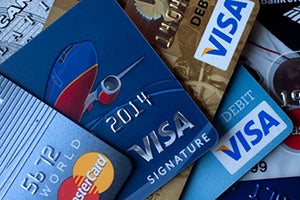The Crime of Credit Card Fraud Under California Law - PC 484e thru 484j
In the state of California, there are several statutes that define and penalize crimes that involve credit card and debit card fraud.

Penal Code 484 PC defines the crime of petty theft, but also includes multiple subdivisions which address the specific crime of committing various types of thefts using credit or debit cards.
These statutes make it a crime for anyone to use a credit or debit card in order to receive goods, services, or money they are not entitled to receive.
The various California statues that specifically address these fraud-related crimes, which consist of stealing, counterfeiting, altering and forging of cards, include:
- Penal Code 484e PC – stolen credit cards
- Penal Code 484f PC – forgery of credit cards
- Penal Code 484g PC – fraudulent use of an access card
- Penal Code 484h PC – credit card fraud by a retailer
- Penal Code 484i PC – counterfeiting credit cards
- Penal Code 484j PC – publish credit card information
This article will review the most common types of credit and debit card fraud charges, penalties, common defenses, and the possibility of a prefiling intervention to reduce or drop charges before court.
Our Los Angeles criminal defense lawyers are providing a detailed review below.
Penal Code 484e PC – Stolen Credit Cards
Penal Code Section 484e is the crime of:
- selling or possessing a credit card, or
- credit card information, such as,
- account number, security number, or PIN number,
- without the permission of the lawful owner.
It should be note you can violate Penal Code 484e PC with the mere possession of the contraband items.
No actual monetary loss to the victim has to occur to be convicted under PC 484e.
Penalties for PC 484e
Violating PC 484e is filed as a grand theft (Penal Code 487) “wobbler” crime, which means it can be charged as either a misdemeanor or a felony.
If convicted of PC 484e as a misdemeanor, the penalties include:
- up to one year in county jail, and
- a $1,000 fine.
If convicted of PC 484e as a felony, the penalties include:
- 16 months, 2 or 3 years in jail,
- a fine up to $10,000
Penal Code 484f PC – Forgery of Credit Card Information
Penal Code Section 484f penalizes the forging of credit card information. Two types of unlawful conduct are covered by this subdivision. PC 484f punishes the:
- altering of an existing credit card, and
- signing of someone's name without their knowledge or permission;
- in a credit card transaction.
Penalties for PC 484f
Violating PC 484f is charged as a forgery (Penal Code 470) and is another California “wobbler” crime.
A misdemeanor conviction carries up to one year in county jail and a fine. A felony conviction carries up to 3 years in jail, a fine, and victim restitution.
Penal Code 484g PC – Fraudulent Use of Credit Card Information
Penal Code Section 484g describes the fraudulent use of a credit card or credit account.
This subsection is aimed at anyone who knowingly uses an:

- expired,
- fake,
- stolen,
- altered,
- forged,
- counterfeit,
- credit card to attempt to complete a transaction for an item of value.
It should be noted again that actual loss to the business or financial institution is not required.
Penalties for PC 484g
Violating PC 484g is charged as either a petty theft or grand theft. If the value of the items was less than $950, it's a misdemeanor carrying up to one year in county jail.
If the value of the items is greater than $950, it's a felony grand theft carrying up to 3 years in jail.
Penal Code 484h PC – Credit Card Fraud by Retailer
Penal Code Section 484h describes retailers who engage in credit card fraud. This occurs when a retailer:
- knowingly charges a credit card for;
- goods or services the merchant didn't provide, or
- accepts payment using a credit or debit card,
- the merchant knows is stolen, fraudulent, or otherwise unlawful.
Penalties for PC 484h
Violating 484h is also charged as either a petty theft or grand theft. Again, if the value of the items is under $950, it's a misdemeanor carrying up to one year in jail and a fine.
If the value exceeds $950, it's a felony grand theft carrying up to 3 years in jail.
Penal Code 484i PC – Counterfeiting Credit Cards
Penal Code Section 484i describes the counterfeiting of credit or debit cards, including:

- manufacturing, and
- possession of counterfeit cards, or
- credit card making devices.
Once again, it's not necessary that the prosecutor prove that the defendant caused a financial loss to a third party, or intended or attempted to cause such a loss.
The mere possession of the counterfeit cards or card making equipment is sufficient to be convicted under Penal Code 484i PC.
Penalties for PC 484i
Violating PC 484i is another California “wobbler” that can be charged as either a misdemeanor or felony crime and carries the same penalties as listed above.
Penal Code 484j PC – Publishing Credit Card Information
Penal Code Section 484j describes the crime of publishing stolen credit card information.
This normally occurs on the internet, but could also occur via mail, in person, or by any other means. The credit card information includes publishing:
- PIN numbers,
- account numbers,
- passwords, or
- other confidential credit card information.
Penalties for PC 484j
Violating PC 484j is a misdemeanor crime carrying up to one year in the county jail and a $1,000 fine.
Overview of California Credit Card Fraud Penalties
As you can see above, most of the subsections of Penal Code 484 can be charged as “wobblers” under California law.
This simply means the prosecutor has the discretion to file either misdemeanors or felonies.
While proving actual losses is not required under most subsections of Penal Code 484:
- a loss amount over $950 will normally result in the case being prosecuted as a felony rather than a misdemeanor.
- the exception is publishing of credit card information under Penal Code 484j PC, which is always a misdemeanor, punishable by up to six months in the county jail.
- for the “wobbler” versions of PC 484, a misdemeanor conviction can result in up to one year in the county jail, and a $1,000 fine, whereas;
- a felony violation could result in 16 months, 2 years, or 3 years in the state prison, and a fine up to $10,000.
Factors that determine how a credit card fraud case is filed
Whether a prosecutor decides to file a credit or debit fraud case as either a misdemeanor or felony will depend on several factors including:
- the intended or actual loss amount to the victim,
- the defendant's prior record, if any, and
- the relatively more or less aggravated nature of the conduct.
What Are the Related California Offenses?
- Penal Code 530.5 PC – identity theft
- Penal Code 503 PC – unauthorized computer access
- Penal Code 459 PC – burglary
- Penal Code 368 PC – elder abuse
- Penal Code 182 PC - conspiracy
- Penal Code 530.5(e) PC - mail theft
How Can I Fight PC 484 Credit Card Fraud Charges?
If you have been accused of any type of credit card fraud in California, there are several common defense strategies, including:
- lack of fraudulent intent
- false allegation
- insufficient evidence
- good-faith mistake
- unlawful search and seizure
Defending charges of credit or debit card fraud will often focus on the intent of the defendant.
No fraudulent intent
Fraudulent intent is simply the intent to deceive the victim, cause them to rely on the false statements made, and deprive them of some valuable property.

Based on the details of the case, we might be able to make an argument you lacked fraudulent intent.
Also, a good-faith mistake should not form the basis for a criminal prosecution under any of the subsections of Penal Code 484.
Prefiling intervention
Through the process of prefiling intervention, we might be able to persuade the prosecuting agency to reduce a felony level arrest to a misdemeanor level filing in court.
It might also be possible to persuade them to reject that charges for prosecution completely.
If you or a family member has been charged with credit or debit card fraud under California law, contact our experienced team of Los Angeles criminal defense attorneys for an initial consultation.
Eisner Gorin LLP is a top-ranked criminal defense law firm located at 1875 Century Park E #705, Los Angeles, CA 90067.
Our main office is next to the Van Nuys Courthouse at 14401 Sylvan St #112 Van Nuys, CA 91401.
Contact our office to review the details of your case at (310) 328-3776.

 If you have one phone call from jail, call us! If you are facing criminal charges,
If you have one phone call from jail, call us! If you are facing criminal charges,